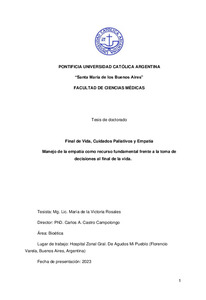Por favor, use este identificador para citar o enlazar este ítem:
https://repositorio.uca.edu.ar/handle/123456789/18719| Título: | Final de vida, cuidados paliativos y empatía. Manejo de la empatía como recurso fundamental frente a la toma de decisiones al final de la vida | Autor: | Rosales, María de la Victoria | Palabras clave: | EMPATIA; CUIDADOS PALIATIVOS; TOMA DE DECISIONES; FINAL DE LA VIDA; SUFRIMIENTO | Fecha de publicación: | 2024 | Resumen: | El presente estudio analiza la empatía como habilidad cognitiva-emocional-afectiva
del médico, que permite vivenciar la situación emocional del paciente y transformar el
encuentro clínico en un acto solidario y responsable. Desde el marco de la bioética
personalista señala la importancia de cuidar abnegadamente al otro atendiendo su
vulnerabilidad y dependencia y subraya el valor de custodiar la vida humana hasta su
cumplimiento natural, haciéndose cargo del otro, acompañando y propiciando la
renovación del sentido de la existencia cuando ésta está marcada por el sufrimiento
y la enfermedad. Considera importante que los médicos cuyo foco de atención este
puesto en las cuestiones relacionadas con el final de la vida, puedan ubicar el
sufrimiento del paciente separado de ellos mismos, con un claro reconocimiento de
que aquel sufrimiento no es el suyo, pero manteniendo una resonancia empática que
los posicione con capacidad para entrar en el mundo del paciente y su enfermedad;
con firmeza personal y profesional.Está enmarcado en la metodología cualitativa, con
un diseño basado en el abordaje de la teoría fundamentada, incorporando los
significados y la intencionalidad inherente a los actos, a las relaciones y a las
estructuras sociales. Analiza veintiún entrevistas semiestructuradas, realizadas en el
hospital Mi Pueblo de Florencio Varela, que tomaron como tema principal planteado,
el Manejo de la empatía como recurso fundamental frente a la toma de decisiones al
final de la vida. Constata que existe una relación entre las habilidades profesionales
requeridas en la práctica y la empatía del médico frente al padecimiento del enfermo.
Describe que la empatía crea un vínculo con el paciente que implica al médico en la
toma de decisiones y el manejo de las emociones. Si bien no se detectó un trastorno
identitario, fueron señaladas alteraciones afectivas causadas por la tristeza que
revelan la verdad subjetiva del profesional. Se indica que la empatía interviene en la
toma de decisiones de la práctica clínica tanto a nivel de la formación y capacitación
profesional del especialista como al nivel que muestra cómo gestiona sus emociones
y aquel en el cual se revisan las conductas adoptadas junto al paciente y su entorno.
El análisis detallado de los niveles de empatía, su manifestación en la personalidad
de los entrevistados y cómo intervienen en la toma de decisiones, comprueba los
beneficios de un trabajo enfocado en defender la intangibilidad de la vida humana y
la dignidad de la persona. The present study analyzes empathy as a cognitive-emotional-affective ability of the physician, which allows us to experience the emotional situation of the patient and transform the clinical encounter into an act of solidarity and responsibility. From the framework of personalist bioethics points out the importance of caring selflessly for the other by attending to his vulnerability and dependence and underlines the value of guarding human life until its natural fulfilment, taking care of the other, accompanying and fostering the renewal of the sense of existence when it is marked by suffering and disease. Considers it important that physicians whose focus is on end-of-life issues should be able to place the patient’s suffering separate from themselves, with a clear recognition that the suffering is not theirs but maintaining an empathic resonance that positions them with ability to enter the world of the patient and his disease, with personal and professional firmness. It is framed in qualitative methodology, with a design based on the approach of grounded theory, incorporating the meanings and intentionality inherent in acts, relationships, and social structures. It analyzes twentyone semi-structured interviews, conducted at the Mi Pueblo Hospital in Florencio Varela, which took as their main topic the management of empathy as a fundamental resource against decision-making at the end of life. It notes that there is a relationship between the professional skills required in practice and the doctor’s empathy for the patient’s condition. He describes that empathy creates a bond with the patient that involves the doctor in decision-making and managing emotions. Although no identity disorder was detected, affective alterations caused by sadness that reveal the subjective truth of the professional were noted. It is indicated that empathy is involved in the decision-making of clinical practice both at the level of the specialist’s professional training and at the level that shows how he manages his emotions and in which the behaviors adopted with the patient are reviewed and their environment. The detailed analysis of the levels of empathy, its manifestation in the personality of the interviewees and how they intervene in decision-making, proves the benefits of a work focused on defending the inviolability of human life and the dignity of the person. |
URI: | https://repositorio.uca.edu.ar/handle/123456789/18719 | Disciplina: | MEDICINA | Derechos: | Atribución-NoComercial-CompartirIgual 4.0 Internacional | Fuente: | Tesis de Doctorado. Pontificia Universidad Católica Argentina, 2023 |
| Aparece en las colecciones: | Tesis de Doctorado en Ciencias Biomédicas |
Ficheros en este ítem:
| Fichero | Descripción | Tamaño | Formato | |
|---|---|---|---|---|
| final-vida-cuidados.pdf | 1,62 MB | Adobe PDF |  Visualizar/Abrir |
Este ítem está sujeto a una Licencia Creative Commons

